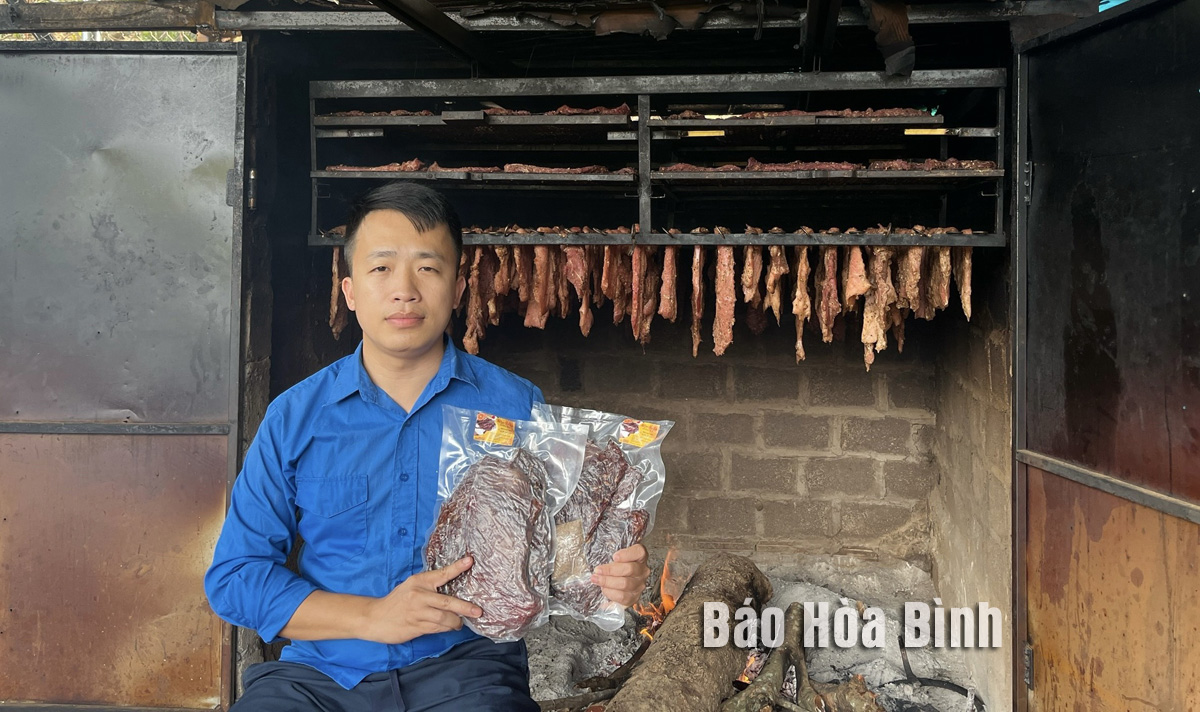
Appreciating the abundant potential and strengths of his hometown for tourism development, Ha Cong Hung, Deputy Secretary of the youth union of Mai Chau district’s Mai Hich commune, embarked on producing smoked meat with a desire to introduce his homeland's specialty to domestic and international tourists.
Ha Cong Hung, from Mai Hich commune, Mai Chau district, introduces his smoked meat product.
Hung began producing his first products in 2017 using locally available buffalo, pork, and beef, which helped ensure the delicious, northwest-standard taste and food safety thanks to traditional breeding methods.
He said his mother is the inspiration and motivation for him to build this model. The dish is very special, only made on special occasions, such as holidays and the traditional New Year festival (Tet).
According to him, to make delicious smoked meat, it is necessary to choose fresh meat from reputable suppliers that meet food safety standards. The meat used for smoking should be from the shoulder, buttocks, and thighs to prevent excessive fat loss during the process. The native pig meat, raised by locals, is often lean, firm, and sweet, giving the smoked dish a distinctive flavour. The processing involves removing tendons, fat and marinating the meat with various traditional spices of the Thai ethnic group. It is essential to use wood from longan trees for smoking to preserve the unique flavour, with an appropriate temperature kept throughout the drying process. As a result, each piece of smoked buffalo or pork meat has a dry and firm outer shell, but the inside is pink and tender. Moreover, no preservatives or chemicals are used during processing to ensure product quality and consumer health.
Currently, Hung's production facility has obtained food safety certification and is in the process of completing documents to have its product accredited under the One Commune One Product (OCOP) programme.
Annually, the facility produces 2.2-2.5 tonnes of smoked meat, generating revenue of about 1.5 billion VND (59,370 USD) and profit of 400 million VND.
Hung said the initial success achieved is thanks to the attention and support of the local Party committee, authorities, and youth union in guiding young people in starting business. With the union’s assistance in reaching customers at homestays and via social media platforms in the area, the product has been widely promoted.
Ha Cong Dat, Secretary of Mai Chau district’s youth union, said Hung not only is a role model for youth union members and young people to follow but also helps boost the local youth entrepreneurship movement.
In Lac Thuy district, communes have been succeeded in promoting their One Commune-One Product (OCOP) products while others are still struggling to position their typical farming products in market. Some communes in the district still fail to have their products met OCOP programme’s requirements, while others have seen their certifications expired.
The inspectorate agency of Hoa Binh province has issued Official Dispatch No. 1090/TTr-PCTN to provincial departments, agencies, localities, business associations, enterprises, and investors regarding measures to improve informal component indexes of the Provincial Competitiveness Index (PCI).
Hoa Binh is taking concrete steps to improve its investment environment, with a strong focus on supporting businesses, settling obstacles for strategic investors, and creating opportunities for robust development in the coming years.
Under the blazing early summer sun, the construction site of Nhuan Trach Industrial Park (IP) in Luong Son district is abuzz with activities from dawn to dusk, a testament to the determination of the investor to meet their construction targets on schedule.



